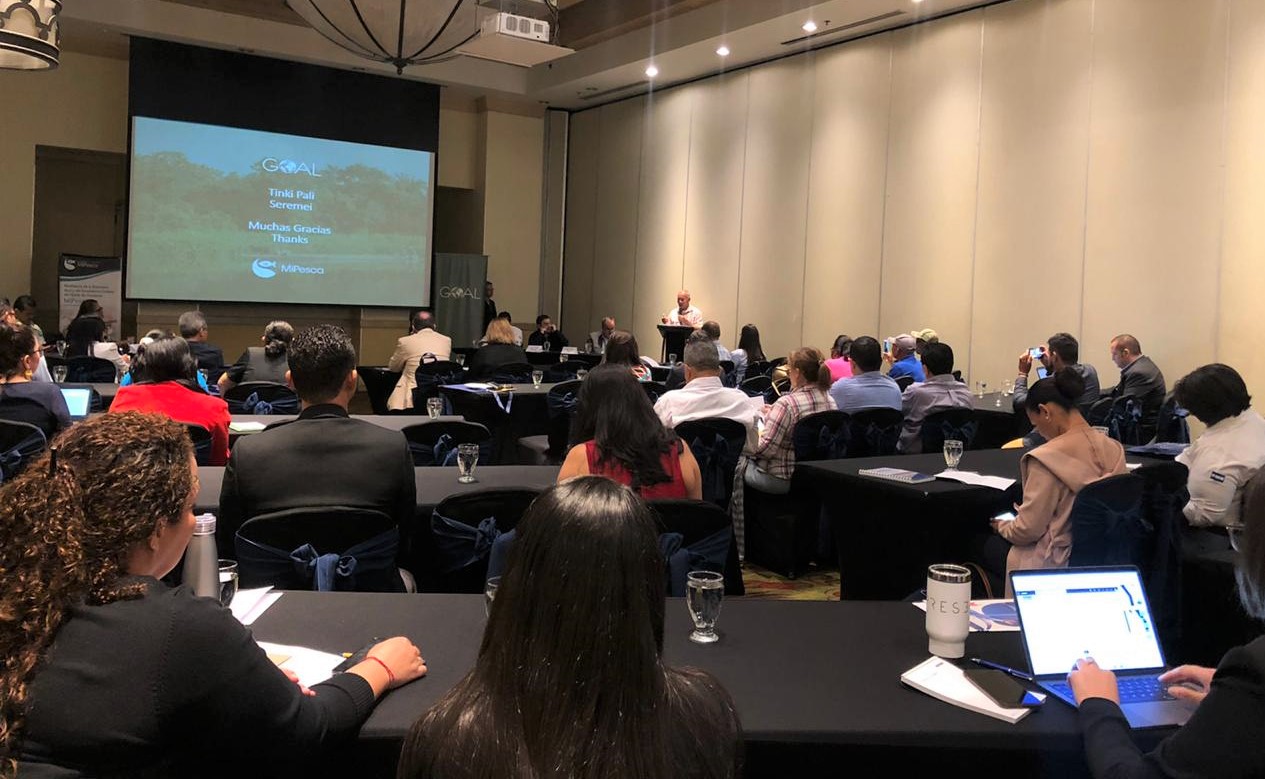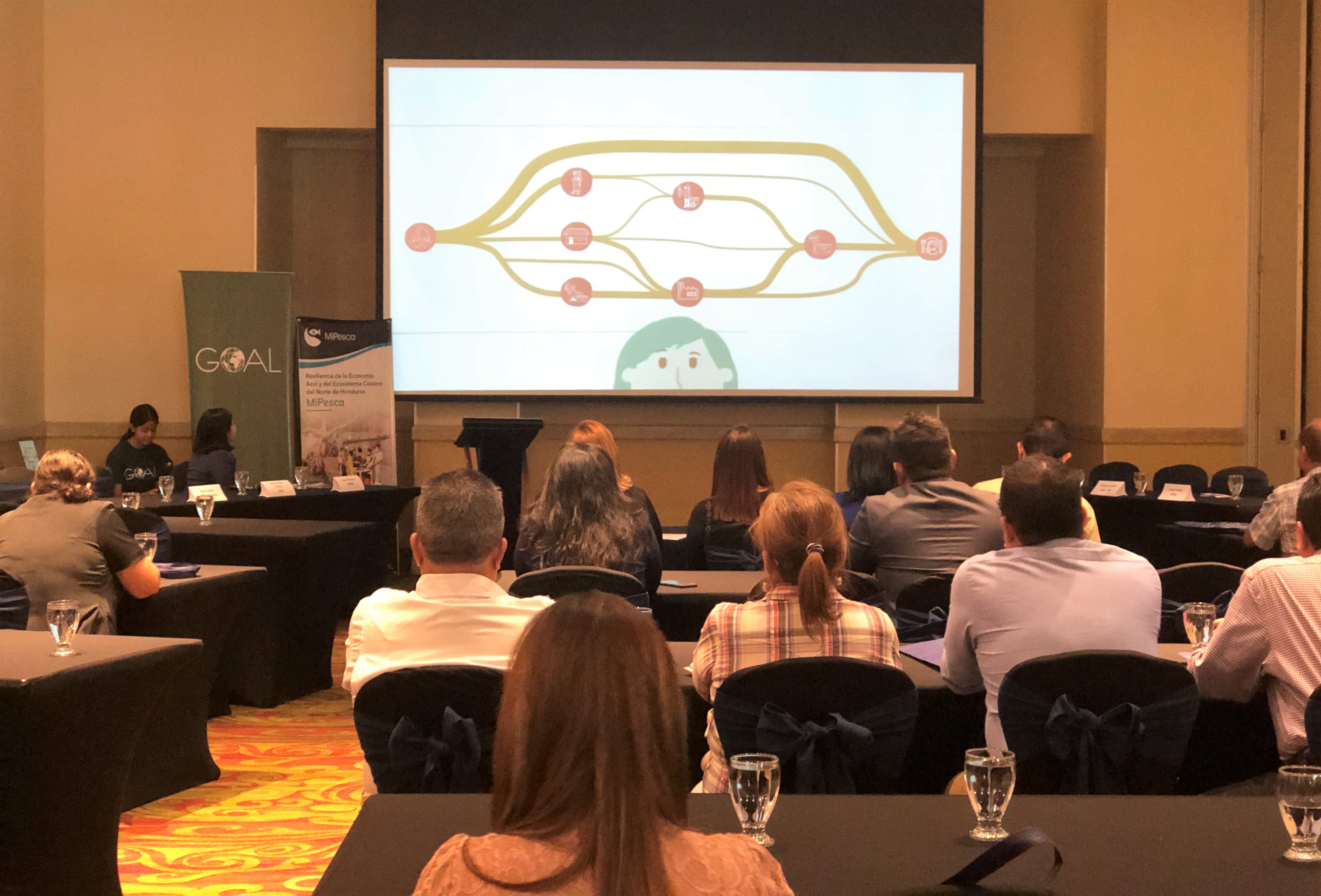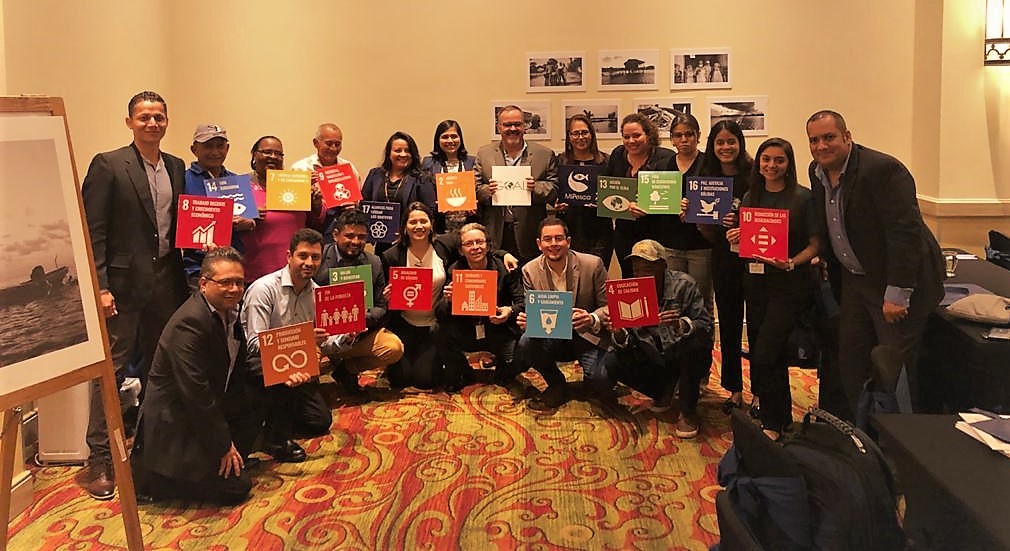Tegucigalpa, Francisco Morazán, January, 29: A new report reveals that a GOAL blue economy project is benefitting hundreds of artisanal fishermen and associated businesses along the Honduran North coast.
An interim report launched today (Wednesday) shows that fishing businesses increased their sales by 70% in the last year thanks to the GOAL MiPesca -“Resilience of the Blue Economy of the Coastal Ecosystem of Northern Honduras” project, co-financed by The Nordic Development Fund (NDF) and The Inter-American Development Bank (IDB Lab).
The report was unveiled at an event “Promoting the Resilience of the Blue Economy: a systemic vision of sustainable and inclusive small-scale fisheries ” at which the “Resilience Approach for Social Systems (R4S)”, developed by GOAL, was also launched. The R4S allows for analysis of resilience of critical socio-economic systems, and proposes recommendations for their strengthening in order to build more inclusive and resilient societies.

Currently, the GOAL MiPesca Program works with several companies, associations and fishing collection centres, representing more than 3,600 artisanal fishermen from the Atlantic coast of Honduras.
As part of the program, 17 companies with seed capital exceeding 1.7 million lempiras (EUR 62,200 approximately) from the IDB | LAB increased their sales by 70% in the last year.
Another of project achievements referred to in the report was the establishment, along with the Forest Conservation Institute (ICF), of sampling of the mangrove ecosystem throughout the country for carbon. This allowed for first national inventory of mangrove and stock of blue carbon. The full report on the carbon collection will be published soon.
Mangrove forests are recognized worldwide as highly productive systems, capable of absorbing carbon from the atmosphere and conserving it for centuries. At the plot level, mangroves can contain approximately the same amount of carbon per unit area as humid tropical forests, due to their high photosynthetic capacity, low decomposition rates and high carbon accumulation rates in sediments.
The mangroves of Honduras are no exception, providing a complex landscape of coasts, lagoons and swamps, which are distributed along the entire continental coastline to the north, to the south, as well as to their islands.
Recognizing the importance of these ecosystems for Honduras and the Isthmus, since 2017, the ICF initiated a monitoring effort by establishing 56 Sampling Units as part of the National Forest Inventory, with technical support from the United States Forest Service, the SilvaCarbon Program and the financial support of the IDB-Mangrove Projects; IUCN’S “Improvement of Coastal Basin and Livelihoods” From the Basin to the Coast” project, MiAmbiente’s REDD projects and GOAL’s MiPesca Project.
“For the first time the country has official data on the total area of mangrove forest coverage and knowing the results of Carbon Stock retained in our mangrove forests allows the country to access the voluntary market for purchase and sale of carbon credits,” said Sayri Molina, General Coordinator of the MiPesca Project, who also explains that these data will allow coastal communities to provide ecosystem services and work on the restoration of coastal-marine ecosystems.

The event concluded with the launch of the “Resilience Approach for Social Systems (R4S)”, developed by GOAL, which allows to analyse the state of resilience of critical socio-economic systems and proposes recommendations for their strengthening, in order to build more inclusive and resilient societies. In this regard, GOAL developed and presented the results of the case study on the application of the R4S Approach in the Small-Scale Fishery System on the North Coast of Honduras. The findings are expected to contribute to raising awareness about the obstacles that limit the sustainable development of small-scale fisheries and possible solutions.
This event was held in Tegucigalpa on January 29, 2020 and among the attendees were governmental organizations, fishing companies, academy representatives, civil society and donors.
For more information on the R4S visit the website:
Resilience for Social System
About MiPesca:
MiPesca is an initiative that has been established with the Government of Honduras, Supermarket Chains, Exporters, Associations and Community Companies of mostly Garífunas and Miskito fishermen. Co-financed by the Nordic Development Fund (NDF) and the Inter-American Development Bank (IDB | LAB), MiPesca is implemented by the Irish international NGO GOAL, in the departments of Cortés, Atlántida, Colón and Gracias a Dios. This project seeks to contribute to the improvement of the competitiveness of artisanal fishing companies and organizations that ensures a sustainable and responsible economic insertion to the environment while preserving the mangrove ecosystem on which their economy depends as well as increasing their resilience to climate change.
About GOAL:
Founded in 1977, GOAL is an international humanitarian and development agency, committed to working with communities to achieve a sustainable and innovative early response to crises and lasting solutions to poverty and vulnerability. GOAL has worked in more than 60 countries and responded to almost all major humanitarian disasters. We are currently operating in 13 countries worldwide.
For more information visit:
http://www.goalglobal.ie

Deja una respuesta
Lo siento, debes estar conectado para publicar un comentario.